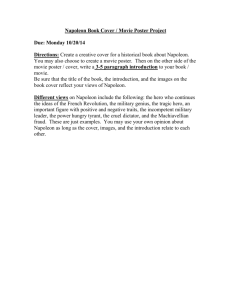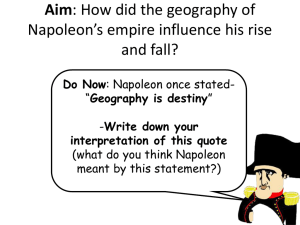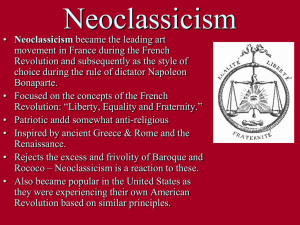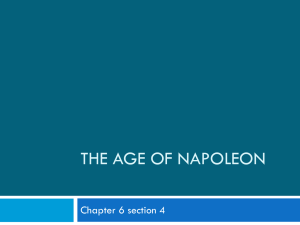Napoleon Bonaparte: Primary Source Documents Analysis
advertisement
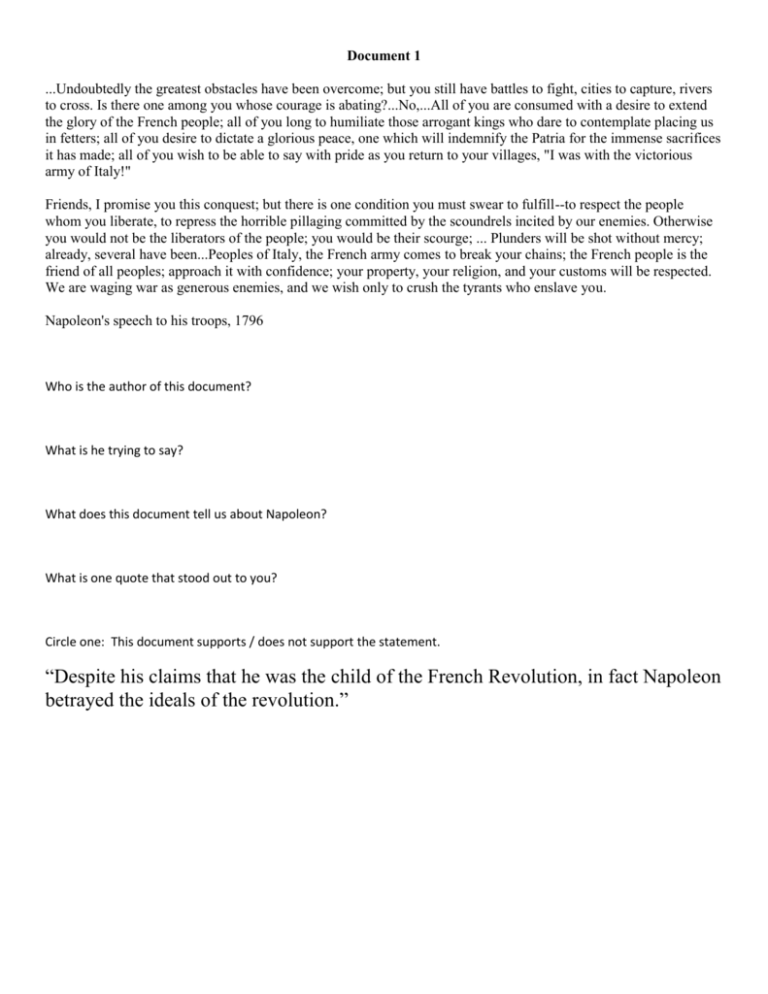
Document 1 ...Undoubtedly the greatest obstacles have been overcome; but you still have battles to fight, cities to capture, rivers to cross. Is there one among you whose courage is abating?...No,...All of you are consumed with a desire to extend the glory of the French people; all of you long to humiliate those arrogant kings who dare to contemplate placing us in fetters; all of you desire to dictate a glorious peace, one which will indemnify the Patria for the immense sacrifices it has made; all of you wish to be able to say with pride as you return to your villages, "I was with the victorious army of Italy!" Friends, I promise you this conquest; but there is one condition you must swear to fulfill--to respect the people whom you liberate, to repress the horrible pillaging committed by the scoundrels incited by our enemies. Otherwise you would not be the liberators of the people; you would be their scourge; ... Plunders will be shot without mercy; already, several have been...Peoples of Italy, the French army comes to break your chains; the French people is the friend of all peoples; approach it with confidence; your property, your religion, and your customs will be respected. We are waging war as generous enemies, and we wish only to crush the tyrants who enslave you. Napoleon's speech to his troops, 1796 Who is the author of this document? What is he trying to say? What does this document tell us about Napoleon? What is one quote that stood out to you? Circle one: This document supports / does not support the statement. “Despite his claims that he was the child of the French Revolution, in fact Napoleon betrayed the ideals of the revolution.” Document 2 ...The more I saw of him, the more I observed him, the more firmly I was persuaded that, always under the sway of the moment, he thought of nothing but his own gratification, of magnifying himself and his power without limit and without rest. Irritated by the least obstacle, sacrificing everything to overcome it, and seeking only to establish at every juncture that nothing could resist his might and his will, when he had to choose between present and future he would choose the present, as being more certain and more subject to his control. In short, he was much less concerned to leave behind him a "race," a dynasty, than a name which should have no equal and glory, that could not be surpassed.... "The impossible," he said to me one day, "is a word of purely relative meaning. Every man has his 'impossible,' according to how much or how little he can do. The impossible," he added with a smile, "is the ghost of the diffident and the refuge of the fainthearted. On the lips of power, believe me, it is only a declaration of impotence." th Count Mole's, a Councilor of State, Minister, and peer of France, remarks on Napoleon, early 19 century. Who is the author of this document? What is he trying to say? What does this document tell us about Napoleon? What is one quote that stood out to you? Circle one: This document supports / does not support the statement. “Despite his claims that he was the child of the French Revolution, in fact Napoleon betrayed the ideals of the revolution.” Document 3 ...He had some grounds for his belief that he was necessary; France believed it, too; and he even succeeded in persuading foreign sovereigns that he constituted a barrier against republican influences, which, but for him might spread widely. At the moment when Bonaparte placed the imperial crown upon his head there was not a king in Europe who did not believe that he wore his own crown more securely because of that event. Had the new emperor granted a liberal constitution, the peace of nations and kings might really have been forever secured. comments from Madame de Remusat, a lady in waiting to Empress Josephine and wife of a Napoleonic official, early nineteenth century Who is the author of this document? What is she trying to say? What does this document tell us about Napoleon? What is one quote that stood out to you? Circle one: This document supports / does not support the statement “Despite his claims that he was the child of the French Revolution, in fact Napoleon betrayed the ideals of the revolution.” Document 4 Napoleon Crossing the Alps by Jacques Louis David, 1800 What event in Napoleon’s life does this picture represent? Who painted this picture? Why did he paint it? What does this document tell us about Napoleon? What is one emotion that you feel from looking at this picture? Why? Circle one: This document supports / does not support the statement “Despite his claims that he was the child of the French Revolution, in fact Napoleon betrayed the ideals of the revolution.” Document 5 My power proceeds from my reputation, and my reputation from the victories I have won. My power would fail if I were not to support it with more glory and more victories. Conquest has made me what I am; only conquest can maintain me. Friendship is only a word; I love nobody; no, not even my brothers. Perhaps Joseph a little; even then it's a matter of habit, it's because he is my elder. -Duroc? Ah, yes, I love him; but why? His character attracts me: he is cool, dry, severe; and Duroc never sheds tears. As for me, you don't suppose I care; I know perfectly well I have no real friends. As long as I remain what I am, I shall have as many as I need so far as the appearance goes... Napoleon's dairy entry on December 30, 1802 Who is the author of this document? What is he trying to say? What is going on in Napoleon’s life in 1802? What does this document tell us about Napoleon? What is one quote that stood out to you? Circle one: This document supports / does not support the statement “Despite his claims that he was the child of the French Revolution, in fact Napoleon betrayed the ideals of the revolution.” Document 6 I am concerned for the happiness of your subjects, not only as it affects your reputation, and my own, but also for its influence on the whole European situation...Your throne will never be firmly established except upon the trust and affection of the common people. What German opinion impatiently demands is that men of no rank, but of marked ability, shall have an equal claim upon your favor and your employment, and that every trace of serfdom, or of a feudal hierarchy between the sovereign and the lowest class of his subjects, shall be done away. The benefits of the Code Napoleon, public trial, and the introduction of juries, will be the leading features of your government. And to tell you the truth...I want your subjects to enjoy a higher degree of liberty, equality, and prosperity hitherto unknown to the German people. I want this liberal regime to produce, one way or another, changes which will be of the utmost benefit to the system of the Confederation, and to strengthen your monarchy. Such a method of government will be a strong barrier between you and Prussia than the Elbe [River], the fortress, and the protection of France. What people will want to return to under the arbitrary Prussian rule, once it has tasted the benefits of a wise and liberal administration? In Germany, as in France, Italy, and Spain, people long for equality and liberalism. Letter written to Jerome Napoleon, King of Westphalia, by Napoleon on November 15, 1807 Who is the author of this document? What is he trying to say? What is going on in Napoleon’s life in 1807? What does this document tell us about Napoleon? What is one quote that stood out to you? Circle one: This document supports / does not support the statement “Despite his claims that he was the child of the French Revolution, in fact Napoleon betrayed the ideals of the revolution.” Document 7 To date from the publication of the present decree, feudal rights are abolished in Spain. All personal obligations, all exclusive fishing rights and other rights of similar nature on the coast or on the rivers and streams, all feudal monopolies of ovens, mills and inns are suppressed. It shall be free to everyone who shall conform to the laws to develop his industry without restraint. The tribunal of the Inquisition is abolished, as inconsistent with the civil sovereignty and authority.The property of the Inquisition shall be sequestered and fall to the Spanish state, to serve as security for the bonded debt. Considering that the members of the various monastic orders have increased to an undue degree and that, although a certain number of them are useful in assisting the ministers of the altar in the administration of the sacraments, the existence of too great a number interferes with the prosperity of the state, we have decreed and do decree as follows.... • Napoleon's Imperial Decree at Madrid, December 4, 1808 Who is the author of this document? What is he trying to say? What is going on in Spain in 1808? What does this document tell us about Napoleon? What is one quote that stood out to you? Circle one: This document supports / does not support the statement “Despite his claims that he was the child of the French Revolution, in fact Napoleon betrayed the ideals of the revolution.” Document 8 The Napoleonic Code was not based on earlier French laws but instead it followed Justinian's Corpus Juris Civilis in dividing civil law into: 1. the law of persons; 2. the law of property; 3. acquisition of property. Napoleon set out to reform the French legal system in accordance with the ideas of the French Revolution because the old feudal and royal laws seemed confusing and contradictory to the people. Before the Code, France did not have a single set of laws; laws depended on local customs, and often on exemptions, privileges and special charters granted by the kings or other feudal lords. During the Revolution, the last vestiges of feudalism were abolished. Specifically, the many different legal systems used in different parts of France were to be replaced by a single legal code. Leading this drafting process was Jean Jacques Régis de Cambacérès, then the Second Consul under Napoleon. However, due to the turmoil resulting from the various wars and strife with other European powers, the writing of the Code progressed slowly until the relative stability of the Napoleonic Empire. Here is an excerpt from the Code: Book I: Of Persons Title I: Of the Enjoyment and Privation of Civil Rights 1. The exercise of civil rights is independent of the quality of citizen, which is only acquired and preserved conformably to the constitutional law. 2. Every Frenchman shall enjoy civil rights (From the Napoleonic Code) Who is the author of this document? What is the Napoleonic Code? When was it written? What does this document tell us about Napoleon? Many of Napoleon’s conquered territories utilized the Code even after Napoleon abdicated the throne. Why do you think this is? Circle one: This document supports / does not support the statement “Despite his claims that he was the child of the French Revolution, in fact Napoleon betrayed the ideals of the revolution.” Document 9 Napoleon Halts the Pillage of Rome, 1796 “The treaty of Campo Formio, signed in October 1797, marked the successful conclusion to Napoleon Bonaparte's campaigns in Italy and the end of the first phase of the Napoleonic Wars. As imperial victor, Napoleon considered himself entitled to strip all his conquered Italian territories of their cultural and artistic treasures. "Rome is no longer in Rome," he is said to have announced exultantly. "The whole of Rome is in Paris." The following year, Napoleon brought his trophies triumphantly back to France. A spectacular cavalcade wound its way through the streets of Paris, while crowds lined the route.” (From bbc.com “Spoils of War” Lisa Jardine) What event in Napoleon’s life does this picture represent? Why was a picture painted about it? What was the political state of France in 1796? What does this document tell us about Napoleon? What is one emotion that you feel from looking at this picture? Why? Circle one: This document supports / does not support the statement “Despite his claims that he was the child of the French Revolution, in fact Napoleon betrayed the ideals of the revolution.” Document 10 Q: What are the duties of Christians with respect to the princes who govern them, and what in particular are our duties towards Napoleon I, our Emperor? A: Christians owe to the princes who govern them, and we owe in particular to Napoleon I, our Emperor, love, respect, obedience, fidelity, military service and the tributes laid for the preservation and defense of the Empire and of his throne; we also owe to him fervent prayers for his safety and the spiritual and temporal prosperity of the state... Q: Are there not particular reasons which ought to attach us more strongly to Napoleon I, our Emperor? A: Yes; for it is he whom God has raised up under difficult circumstances to re-establish the public worship of the holy religion of our fathers and to be the protector of it. He has restored and preserved public order by his profound and active wisdom; he defends the state by his powerful arm; he has become the anointed of the Lord through the consecration which he received from the sovereign pontiff, head of the universal church. Q: What ought to be thought of those who may be lacking in their duty towards our Emperor? A: According to the apostle Saint Paul, they would be resisting the order established by God himself and would render themselves worthy of eternal damnation. Napoleonic Catechism, 1806 (Catechisms are doctrinal manuals by the Catholic Church often in the form of questions followed by answers to be memorized) Who is the author of this document? What is the topic of “conversation”? When was it written? What was the political state of France in 1806? What does this document tell us about Napoleon? Circle one: This document supports / does not support the statement “Despite his claims that he was the child of the French Revolution, in fact Napoleon betrayed the ideals of the revolution.” Name: _______________________________________________ Period: _________________ Task 2: Napoleon & the French Revolution Supporting Evidence Place all documents (1-10) in a category below and write a sentence of explanation as to why you designated it as such category. Supports Napoleon betraying ideals of the French Revolution Does not support the idea that Napoleon betrayed ideals of the French Revolution Task 3: Napoleon & the French Revolution Introduction and Thesis The 10 documents you have been given are the supporting documents used to write a DBQ essay. Read the historical context and task, write the introductory sentence(s) and a thesis statement. The goal is to have a complete introductory paragraph when the two sections are combined. Historical Context: The slogan of the French Revolution was Liberty, Equality and Fraternity. The Revolutionaries like Robespierre and Danton strove to give the 3rd Estate a voice in the governing of France. They rid the government of absolute rulers and put the decisions of France’s future in the hands of the people. Despite the ultimate failure of the Republic, their legacy made a large impact on the future of France. Task: Assess the validity of the following statement. (Basically, do you agree or disagree?) “Despite his claims that he was the child of the French Revolution, in fact Napoleon betrayed the ideals of the revolution.” Intro: (In a short sentence set the stage for your reader. . .) _____________________________________________________________________________________ _____________________________________________________________________________________ _____________________________________________________________________________________ _____________________________________________________________________________________ Thesis: (State your position on the topic and provide a “preview” of how you will prove it!) _____________________________________________________________________________________ _____________________________________________________________________________________ _____________________________________________________________________________________ _____________________________________________________________________________________ _____________________________________________________________________________________ _____________________________________________________________________________________ _____________________________________________________________________________________




